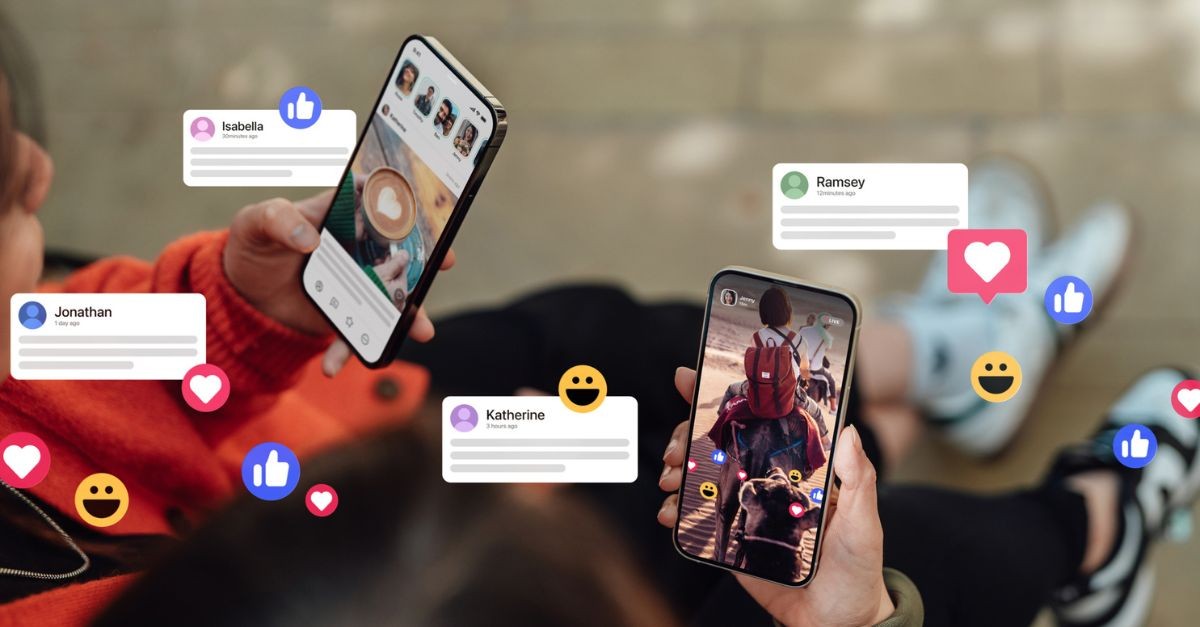5 Reasons for a Christian to Remain Engaged on Social Media
Spiritual Life


Audio By Carbonatix
By Jennifer Slattery, Crosswalk.com
About three years ago, I decided to leave Facebook. This stemmed from numerous reasons, most of which involved feeling unfairly censored by the platform’s algorithm. They removed posts I prayerfully crafted to encourage and support people in my Faith Over Fear group, routinely flooding my page with ads and fear-mongering clickbait. But the last straw came when the site deleted my personal account without cause. As a result, I not only lost connection with over 5,000 friends and colleagues, but it also left numerous people hurt when they assumed I’d unfriended or blocked them.
Frustrated and interpreting these challenges as God’s redirection, I declared that I was done with social media. But then a friend helped me to view my circumstances and the platform differently. In short, she reminded me of the need for Christ-followers to remain in the very areas they feel pushed out, as our world needs more, not less, godly influence. After much prayer, I came to agree with her wisdom. While I had ample reason to walk away, I sensed the Holy Spirit encouraging me to stay.
Here’s why.
Photo Credit: ©iStock/Getty Images Plus/grinvalds

1. To comfort the hurting.
According to various studies, those who engage most on social media often struggle with deep loneliness. When I consider the latest statistics, I suspect there’s an overlap between those who ache for increased connection and those who feel their circumstances limit face-to-face interactions. Perhaps they experience health difficulties that challenge their ability to attend a Bible study or other relational gathering. Others live as full-time caregivers and feel reluctant or unable to entrust this role to someone else. Maybe they recently moved to a new area, haven’t yet formed supportive relationships locally, and yearn to maintain friendships with those residing in the area they left.
We all need to feel seen, understood, and accepted, and social media at its best can help provide a sense of connectedness that makes one feel less alone and their hardships less hard.
For Alex Ehly, online pastor at Christ Community Church in Omaha, NE, this looks like publicly sharing how faith intersects with his life. “I like to utilize social media to Psalm my life,” he said. “The Psalms are not filtered or sanitized. They are real-time prayer and processing with God. When I share both the gratitude and grief of my life like that, I hope it encourages other believers that they are not alone in either their joy or their ache.”
When you “Psalm your life,” others see faith that’s raw and real.
This is one way we can practice 1 Thessalonians 5:11, which reads, “Therefore encourage one another and build one another up, just as you are doing.”
Photo Credit: ©iStock/Getty Images Plus/AsiaVision

2. To counter our world’s darkness with light.
Most of us recognize the increased hostility and polarization that exists between liberals and conservatives and, often, Christ-followers and those with other worldviews. Sadly, social media tends to highlight and maximize these divisions. Obviously, there are numerous reasons for this, from algorithms that determine what types of posts people see, to fear-mongering clickbait that makes users feel constantly under attack, and the dehumanizing effect that often occurs when interacting with others through a device.
But that’s also why kind and thoughtful posts hold such capacity for good. When we share content filled with life-giving truth, hope, and joy, our posts provide a stark contrast to the unsettling and gloomy posts that often flood people’s screens. As Jessica Brodie, author of Tangled Roots, stated, “It’s a chance to shine the light ever stronger in what can be a very dark place. The world needs the message of Christ, and it needs that message to counter evil.” She also feels it allows her to tell others about the Good News, adding, “We’re commanded to share the gospel with the world, and social media is part of the world. It also gives us tremendous reach–one message can travel the globe with ease and speed and get to many, many more people than I can typically do on a given day in person.”
Devotional writer Susan Aken agrees. “If Christ followers don’t share their beliefs on social media,” she said, “there will be no light shining in the darkness. We must keep letting our lights shine.”
Jesus stated it this way: “Neither do people light a lamp and put it under a bowl. Instead, they put it on its stand, and it gives light to everyone in the house. In the same way, let your light shine before others, that they may see your good deeds and glorify your Father in heaven (Matthew 5:15-16, NIV).
Photo Credit: Unsplash/Fachy Marin

3. To form and maintain connections with distant family, friends, and colleagues.
As a Christian communicator, I spend much of my day in my office, by myself. Initially, this felt isolating, leaving me with two options: connect with others outside the house, which limited the time I spent writing, or focus on my deadlines, which reduced my interactions with friends. This changed in 2009 when I joined two online platforms: American Christian Fiction Writers, a professional organization for novelists, and Facebook. This allowed me instant and easy access to others with whom I could connect.
Needless to say, this made a historically solitary endeavor more collaborative and enjoyable.
Picture book and Bible study author Jenny Fulton agrees. “In a time and a world where it’s so easy to move from place to place, social media allows us to reconnect and maintain contact with those we once had a personal connection to.” Whereas, in the past, our influence often decreased as the distance between us increased, platforms like Facebook and Instagram allow us to share truth with those living across the globe in authentic and gentle ways. “Because we knew and interacted with these people in real life,” Jenny says, “they’ll often take more notice of what we post and have to say about different issues. I’ve seen God use my blogs and other social media posts to encourage believers who were struggling and to offer perspectives to a not-yet-believer who is searching for answers.”
Photo Credit: iStock/Getty Images Plus/yacobchuk

4. To share and receive information.
If you follow me on Facebook, you know how much I rely on the platform to fact check, gain ideas for story elements, learn of fun events, and stay up to date with those I care about and spiritual leaders I follow. Considering all the recipes I’ve discovered and tried, I’m confident my husband finds value in this aspect of social media as well. I’ve learned about ways to make certain foods healthier and have discovered restaurants and fun places to visit to which I likely otherwise would’ve remained oblivious.
When I led Wholly Loved Ministries, a parachurch organization I founded to help women more deeply experience the love of Christ, I relied heavily on social media to alert our followers of upcoming conferences and products. Many other Christ-centered organizations do the same. This felt particularly sacred during COVID when many churches with buildings closed for the shutdown began live-streaming their sermons. This helped to create a habit in me of seeking out inspiring free content, which social media makes readily available. These additional resources allowed me to feed my soul with a simple click of my trackpad, and the diversity of material helped me receive a more robust gospel message.
While, sadly, social media reveals the hostility and division plaguing our nation and world, attempting to suck us into the toxicity, it also enables us to recognize and connect with the global church. Prior to its invention, it was far too easy to remain entrenched in our denominational environment with little understanding, camaraderie, or engagement with those who hold different views on certain Scripture passages.
The goal, then, is to view our culture’s fractures through the lens of truth and grace while focusing on and amplifying the supernatural family bond of the Holy Spirit. As Ephesians 4:3-6 states, "Make every effort to keep the unity of the Spirit through the bond of peace. There is one body and one Spirit, just as you were called to one hope when you were called; one Lord, one faith, one baptism; one God and Father of all, who is over all and through all and in all (NIV, emphasis mine).
We do this every time we support, encourage, or collaborate with another Christ-follower. The beautiful truth is, when we live like this, the watching world notices. As Jesus stated in John 13:35: “By this everyone will know that you are my disciples, if you love one another” (NIV).
Photo Credit: ©Getty Images/Oscar Wong

5. To challenge false narratives and caricatures of Christ-followers.
Years ago, I wrote for a global evangelism organization that reached readers and radio listeners in, at that time, over forty different countries. My editor taught me how to create content that hits people from different cultures in the least offensive way. This experience reminded me that men and women often hear or read our words through the lens of learned stereotypes.
For example, when we tell nonbelievers we’re Christian, their minds don’t always connect this with Jesus. Instead, they often translate this as “middle-class white republican,” or, as is increasingly becoming the case, as rigid and judgmental nationalists. You may have read some common accusations, such as stating that we’re arrogant, out of touch, angry, hateful, and oppressive.
Sadly, there are Christ-followers who fit these stereotypes. In my experience, while they might be loud and attacking, they’re the minority. Most believers I know personally strive to show God’s love and grace. We can do so in the grocery store checkout line, as we drive respectfully on the freeway with our fish stickers prominently displayed, and as we share bits of our lives on social media.
Anytime we defy negative assumptions regarding our nature and motives, we shock people (in a good way) into paying attention, challenge their often faulty pre-conceived ideas, and ignite curiosity in their souls that the Lord can then use to draw them to salvation.
This is the message Kristi Woods, author of 101 Prayers for Military Wives, longs to convey. She said, “As a veteran wife writing resources for military spouses, many of whom aren’t believers, it’s my hope my posts point to a loving God who’s relational and real. One who sees them and their needs.”
What an easy and loving way to advance God’s kingdom!
I understand how frustrating social media can feel, especially during politically or economically tense seasons. When the algorithms and paid advertisers flood our feeds with fear-mongering and intentionally divisive articles, or we read hurtful and hateful posts about the demographic with which we identify, it can feel tempting to walk away. If God leads you to do so (and He might, for reasons unique to you), then by all means, obey. He knows best where to position each of His children for maximum impact. If He hasn’t relayed “an exit plan”, however, prayerfully consider using the platform to encourage the hurting, counter this world’s darkness with God’s light, invest in distant relationships, share and receive helpful information, and expel (largely) inaccurate stereotypes that make it difficult for people to see and receive Christ.
Photo Credit: ©Getty Images/Tim Robberts

























